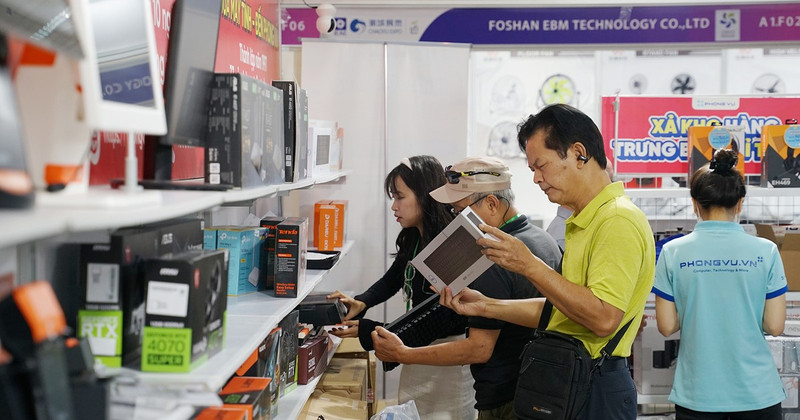Strong export growth in multiple markets
After nearly 20 years of operation, Lai Hoang Duong, Director of Thanh Giong Computer and Media Joint Stock Company, transformed the business from an importer and distributor of computers into a production and assembly enterprise with the goal of creating "Made in Vietnam" computers. The company's products have gained recognition not only from domestic consumers but also from international markets. As of the third quarter of 2024, the company has met its annual revenue target, with a steady flow of orders continuing into the final months of the year, prompting the company to increase shifts and hire more workers to meet delivery deadlines.
According to statistics, 2023 marked the first year in over a decade in which Vietnam's electronics industry saw a decline in growth. To boost exports, the government and relevant ministries have implemented various measures to open new export markets, including notable successes in market negotiations and trade agreements. As a result, the recovery of the electronics sector began in early 2024, with significant growth in major markets. Specifically, the export of computers, electronic products, and components saw strong growth in the first nine months of 2024, with key markets including the US (17.32 billion USD, up 46.5%), China (9.10 billion USD, down 8.9%), the EU (6.86 billion USD, up 55.9%), Hong Kong (China) (6.13 billion USD, up 68.7%), and the Republic of Korea (4.03 billion USD, up 13%).
The export of electronics, computers, and components has become a key contributor to Vietnam's export economy, stabilising the macroeconomy, creating jobs, and improving the standard of living for workers. It also adds value to domestic production and positively impacts related industries, enhancing labour skills and production capabilities to meet the growing demands of international markets. The sector's growth has increased foreign exchange earnings for the national budget and contributed to macroeconomic stability, providing a strong foundation for further production expansion and attracting both domestic and foreign investments. Many global technology giants have been continuously investing in manufacturing and shifting production to Vietnam, marking significant investments in the country’s electronics sector.
 |
| Electrical equipment production line of Rang Dong Light Source & Vacuum Flask Joint Stock Company. (Photo: NAM ANH) |
Relatively low economic benefits
According to Do Thi Thuy Huong, a member of the Executive Board of the Vietnam Electronic Industries Association, despite positive market signals, Vietnamese businesses are still unable to participate in high value-added segments such as research and development (R&D), design, and distribution. Most businesses are involved in the assembly segment, resulting in a low value-added rate, accounting for only about 5-10% of total export turnover. This means that, despite the large export volume, the economic benefits from Vietnam’s participation in the global electronics supply chain are relatively low. In addition to lacking capital to expand production and invest in modern technology to improve productivity, product quality, and management and operational skills, the number of foreign businesses joining Vietnam's supply chain, particularly from China, has recently increased. This will continue to pose significant challenges for domestic companies, as they must compete in a market with many large technology corporations. In fact, FDI businesses in this sector tend to prioritise their suppliers over domestic companies.
In this context, Vietnamese businesses have been making efforts to invest in technology to participate more deeply in the supply chain and handle segments that offer higher added value. However, alongside these efforts, the association is calling for policies that promote key industries such as electronics. Specifically, there is a need for incentives in loan access, debt rescheduling, and debt deferral to allow businesses the resources to invest, develop, and expand production to meet order requirements. “We hope the government will be more open and provide more opportunities for domestic businesses in accessing loan capital without requiring collateral when there are orders and production outsourcing. This would provide more opportunities for local businesses,” Huong said.
According to the Ministry of Industry and Trade, in addition to focusing on improving the quality of the workforce, domestic businesses need to pay more attention to investing in production lines and applying science and technology to better meet quantity, quality, and delivery time requirements. Additionally, strengthening links with domestic and international research institutes, as well as foreign corporations, will help businesses quickly access new technology production lines. This will improve production capacity, meet the demands of foreign corporations, and deepen involvement in the global value chain. In the context that production processes with high added value are still dependent on foreign production chains, businesses need to actively gather information, position themselves in the market, and identify target customers.
In the near future, the Ministry of Industry and Trade will continue to enhance market information dissemination, advocacy, and training to raise awareness among businesses about sustainable development, green production, brand building, and more. In particular, the ministry will work through cooperation mechanisms and continue to advocate for policies with trade partners to remove barriers to market access, minimising cost burdens for producers and exporters. At the same time, the ministry will require partner countries to strengthen dialogue to clarify technical requirements and regulations for imported products and apply suitable implementation timelines to give Vietnamese businesses time to transition. It will also provide support and specific guidance to help businesses adapt to new regulations. At the same time, the ministry will continue to propose market partners to provide technical support through specific programmes, helping to enhance business capacity, build sustainable production models, and promote a circular economy to meet standards. The ministry will also continue to cooperate with other ministries, sectors, and associations to promote trade and support businesses in selling goods both domestically and for export.
According to data from the General Department of Customs, in the first nine months of 2024, the products contributing the largest export turnover to Vietnam's economy were computers, electronic products, and components, reaching 52.76 billion USD, accounting for 17.6% of the total export value of the country. This represents an increase of 27.4% (equivalent to 11.33 billion USD) compared to the same period last year, and a rise of 10.87 billion USD compared to the previous record high of 41.89 billion USD in the first nine months of 2022.
















